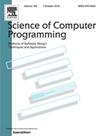微服务模拟器:面向对象的事务因果一致性框架
IF 1.5
4区 计算机科学
Q3 COMPUTER SCIENCE, SOFTWARE ENGINEERING
引用次数: 0
摘要
由于一致性问题对业务逻辑设计的影响,微服务系统的开发非常复杂。另一方面,微服务的实现需要大量使用中间件技术,这就延迟了一致性问题的测试和识别。我们介绍了一个面向对象的框架,它支持根据事务因果一致性模型设计的微服务系统的快速原型开发。本文章由计算机程序翻译,如有差异,请以英文原文为准。
Microservices simulator: An object-oriented framework for transactional causal consistency
The development of microservice systems is complex due to the impact consistency problems have on the business logic design. On the other hand, the implementation of a microservice requires extensive use of middleware technology, which delays the test and identification of the cases where consistency problems can occur. We introduce the Microservices Simulator object-oriented framework that supports the rapid prototyping of a microservice system designed according to the Transactional Causal Consistency model.
求助全文
通过发布文献求助,成功后即可免费获取论文全文。
去求助
来源期刊

Science of Computer Programming
工程技术-计算机:软件工程
CiteScore
3.80
自引率
0.00%
发文量
76
审稿时长
67 days
期刊介绍:
Science of Computer Programming is dedicated to the distribution of research results in the areas of software systems development, use and maintenance, including the software aspects of hardware design.
The journal has a wide scope ranging from the many facets of methodological foundations to the details of technical issues andthe aspects of industrial practice.
The subjects of interest to SCP cover the entire spectrum of methods for the entire life cycle of software systems, including
• Requirements, specification, design, validation, verification, coding, testing, maintenance, metrics and renovation of software;
• Design, implementation and evaluation of programming languages;
• Programming environments, development tools, visualisation and animation;
• Management of the development process;
• Human factors in software, software for social interaction, software for social computing;
• Cyber physical systems, and software for the interaction between the physical and the machine;
• Software aspects of infrastructure services, system administration, and network management.
 求助内容:
求助内容: 应助结果提醒方式:
应助结果提醒方式:


